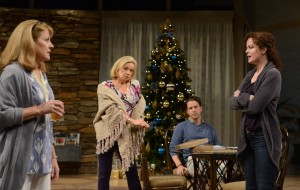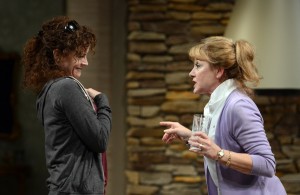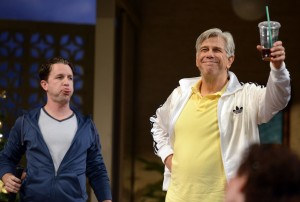Other Desert Cities, is the story of a family: Father, Mother, Mother’s Sister, Son and Daughter and the interactions during a Christmas gathering. The parents are stalwarts of the conservative Republican Party, friends to Nancy and Ron (Reagan) among others. Daughter is a liberal, and It would be easy to dismiss the story as being about political tensions and difference. But that is unfair to the depth of these individuals, and I left wondering how often I am guilty of missing the depth of a person because of how I pigeonhole them due to their political affiliations. Indeed, I left the show wondering if politics is just a tool we use to distance ourselves and make ourselves safe from vulnerability? Of course politics is more than that, but is that how we use it?

The daughter has written a book. It isn’t the same story that the brother or the father or the mother experienced, and it isn’t even clear if it was her experience either. But no matter, the book is a calling out for the missing pieces, a reaching for more that helps the past make sense.
 The play’s name comes from a road sign seen on your drive into the Palm Springs area; a sign I have seen numerous times. But it really is deeper than that. The show revolves around the family dynamics of a nuclear family. All of the love, fear, frustration, longing, fighting, resolution, control, and out of control-ness that make up those dynamics. As I watched, I thought about how my own family was both similar and different from this family, and how much I related to something the daughter says: the notion of wanting to just drive on by and go off, to another city. I think she believes that this would take her away from what she will find there with her family. But there is no such place, as other desert cities– as if they are unlike this one. No matter where you are, family dynamics are what they are, and there is no getting away from it. And that is the implication, isn’t it? That those other cities are filled with families which are not like our own. Nope. This family’s story is also other families’ story, even if the details are not identical.
The play’s name comes from a road sign seen on your drive into the Palm Springs area; a sign I have seen numerous times. But it really is deeper than that. The show revolves around the family dynamics of a nuclear family. All of the love, fear, frustration, longing, fighting, resolution, control, and out of control-ness that make up those dynamics. As I watched, I thought about how my own family was both similar and different from this family, and how much I related to something the daughter says: the notion of wanting to just drive on by and go off, to another city. I think she believes that this would take her away from what she will find there with her family. But there is no such place, as other desert cities– as if they are unlike this one. No matter where you are, family dynamics are what they are, and there is no getting away from it. And that is the implication, isn’t it? That those other cities are filled with families which are not like our own. Nope. This family’s story is also other families’ story, even if the details are not identical.
My experiences of Palm Springs are those of Warm Sands Drive, gay resorts, clothing optional sun decks, and afternoon tea dances. That world seems so removed and different from the Palm Springs of the play, yet in reality both are in the same geographic place. How often, this happens: two exclusive worlds so unaware of the other, yet happening at the same time in the same space.
A friend had told my partner that the play was full of laughs and quite funny. This may be true, but for every light moment of humor, there is an equally heavy intense moment of angst or conflict. This is no comedy, yet even the chaos and conflict are not hopeless, like in Boys in the Band. In that show, the characters just seem wounded beyond repair. Here, as quickly as you might want to write them off, you see a glimpse of something that says there is real light ahead, and it isn’t a speeding train.

I liked or I disliked every character of the play at one point or another, and sometimes quite strongly. Enough so, that I’d say I hated them or loved them. In a way, both of the parents are the types I would generally write off as nothing more than bigots, but in reality, they were also loving parents, and the degree to which they loved their children was enviable. And even as I hated them I found myself achingly wanting that love. My favorite character is the mother. I wanted to throttle her, and I cheered for her, all at different times. But as enviable as that love seemed, it was overshadowed by fear, self preservation, undeserved loyalty, and secrets. The devastating harm of secrets, is no less, in fact it is perhaps more horrifying when love is considered as the justification.

I left the theater, while my partner went off to use the restroom, and the first thing that came to my mind was that I had to call my father and tell him that I loved him. That was the very farthest thing from what I thought this show would do for me. But there is was. As I have sat with the story over time, I have grown more and more angry at the father in the play. His action of love for one child was not all the knee-jerk reaction would suggest, and devastated the lives of all of his children, his family and more.
I am not a theater critic, and don’t even pretend to play one on my blog. I write to share my experience of a show, but I must say that I didn’t like the playwright’s ending. I thought there was a moment earlier in the play but close enough to the end which seemed like a more real end to me. That’s all I’m going to say about it. If you want to know more, feel free to take me out for a cup of coffee after you see the show and I’ll explain myself and see what you thought.
Other Desert Cities runs till June 30th at the Pittsburgh Public Theater.
2 Comments